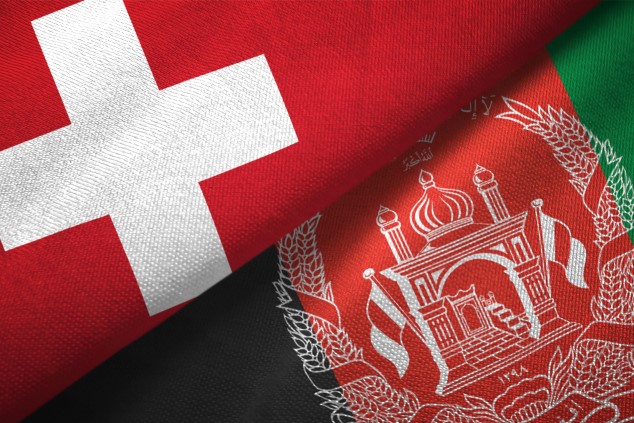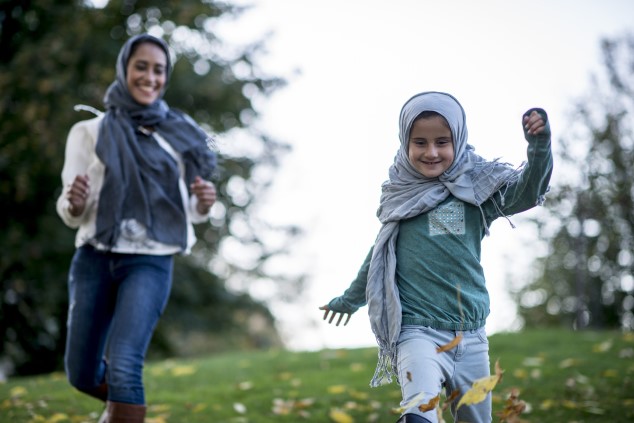In the series “Off Duty”, various members of the InterNations team share their personal stories about a global lifestyle and the international experience.
For this first installment, we have talked to Vera, our Media Spokesperson and Deputy Head of Content and Communications. A Swiss-American expat, she has been living in Munich since 2010. For the past three years, Vera has been assisting a local family of refugees who’d newly arrived in Germany.

Can you tell us more about the refugees you’ve been supporting?
The family I’m friends with comes from Afghanistan, from a very small village near Herat, which is the second-largest city after Kabul. In the western part of the country, as elsewhere in Afghanistan, the Taliban are still active. The German Foreign Office describes the current security situation as “confusing and unpredictable”. It’s very hard to lead a normal life there right now.
They are a couple in their 30s and have three children, whom they took along on their long journey: The oldest child is a twelve-year-old boy; there’s a girl, who is about eleven years old, and their little son has only turned six. When they arrived here over three years ago, he was just a toddler.
Several of the parents’ siblings had also left, and some of their relatives were even living in Germany already, I think. It really helps they haven’t lost all their family. They had to leave behind their own parents — the children’s grandparents — in Afghanistan, though, as they are already older and have some health issues. This is probably what my friends worry about the most.
How did you meet them originally?
This entire story actually starts with InterNations. Being an expat myself, I was an InterNations member before I started working here. I spontaneously decided to become a Consul for the Munich Changemakers Group, our local community outreach program, a role which I filled for a couple of years. The group has supported different causes over the years, but back then, we mostly focused on refugees.
In this role, I worked together with Caritas, a relief, development, and social services organization. I would host activities for children from refugee families; for example, we’d go to the playground or do arts and crafts projects together, and I’d invite expats from InterNations to join us or to help the kids with their homework. It was a very rewarding experience for everyone involved.
Through this organization, I was introduced to this family. In 2015, Caritas appointed me as a sort of mentor to support their children when they started attending school in Germany. But our relationship changed very quickly. Somehow, this family was different from all the others I’d met. First, I became really close to the girl, who began to regard me as an honorary “auntie”.
Apart from my relationship with the children, I also got to know Farzana (*), their mom, a lot better. By now, I consider her one of my best friends, and I simply enjoy spending time with her. Officially, I’m not affiliated with Caritas anymore. At some point I told them that my reason for visiting was not volunteering or mentoring anymore, but actual friendship.
I try to drop in once a week, and they’ll invite me for tea or dinner. If they have any questions or problems, I’ll help them, of course, but a lot of times, we just talk.

How does the experience of volunteering with refugees relate to your day job of working for a global expat network?
This experience has shown me how difficult it is to start over as a foreigner in another country. I wouldn’t even limit this to refugees, although it is obviously a lot harder for them because of the legal issues involved.
Initially, my friends’ situation was a bit of a nightmare. They waited for a whole year to find out if they’d be permitted to stay in Germany, which was an incredibly stressful time. They had three kids in school, and they didn’t know if they might have to up and leave the country within two weeks. At the moment, they can stay for an overall period of five years before their case will be reevaluated.
More generally speaking, the entire process of arriving in a new place can be incredibly difficult. It’s not just about the language barrier, but you don’t understand the rules. You don’t know how the system works.
Sometimes, they’d receive letters from the immigration office, the welfare office, or I don’t know which government authorities. Even I didn’t always understand what they were supposed to do, and I’ve had to call various organizations at times. I find this rather troubling and confusing — if I, as a German native speaker, can’t figure out those documents, how should they?
But, in Munich at least, there are a lot of resources available, and my friends are mostly taken care of very well. I see how grateful they are for the support they receive.
Is there any memorable moment that represents your intercultural friendship perfectly?
Oh yes, the “table story”! My friends are very welcoming and generous people, and they can be really sensitive to cultural differences. For the first two years I visited them, there was this large table in their living room. We’d usually sit down at the table and drink tea while the children were playing.
One day, however, Farzana asked me, very, very shyly: “Vera, would you mind sitting on the floor instead? It’s really not a big deal if you don’t want to.” When I explained I didn’t mind at all, she put down cushions and a blanket for dinner. It was at this point I realized this table was there for one reason only, and that reason was me being their guest.
Ever since we started having dinner Afghani-style, the table has mysteriously disappeared.

Would you say this friendship has also affected your own outlook on the world?
I think this experience has in fact changed my personal perspective. I see how my own life might have turned out rather differently. Farzana and I, we are both about the same age, around 30, but we’ve taken very different paths in life.
If you are from rural Afghanistan, you won’t have the chance to get a twelve-year education, or even go to university. Farzana attended elementary school for six years, dropping out to get married in her early teens.
It was an arranged marriage, which is a very common practice in Afghanistan. She says she was lucky: Her husband was a young man, only a few years older, and she didn’t get engaged to someone old enough to be her father. However, marrying at such a young age also means that she had her first child quite early. I feel like she’s only started discovering other possibilities. Nobody has asked her what she wants to do with her life.
Both she and her husband are now attending mandatory German classes. They need a B1 level certificate before they can enter the German labor market, which requires 400 hours of study or more. This is quite the challenge if you’ve never formally learned a foreign language before, let alone one as complicated as German!
For her husband, this goal is still rather far away. His traditional role would consist of being the breadwinner and taking care of his family, but he’s unable to do so because he lacks the necessary language skills. Farzana, on the other hand, is already at a very different stage in the process, preparing to take the B1 language exam soon. The changing nature of their relationship can’t always be easy to deal with for them.
But I’m very happy to see that she, at least, seems to be flourishing and settling in well. Her fluency in German is increasing more and more: We often have fairly complex and personal conversations about such topics as religion, the way we grew up, the moral standards we try to follow, women’s place in society, and everything that sets our cultures apart. Sometimes, the kids get really bored and interrupt us, like: “Can we just watch TV now, please?”
I do admire Farzana very much for approaching life the way she does. After growing up in a war-torn country, she often reflects upon her own values and beliefs and strongly questions how others can consider themselves to be good and righteous people or true believers without being kind and respectful.

Have you had any personal challenges to overcome during the time you’ve known them?
First of all, I had to examine my own assumptions. When I first met my friends, I simply took it for granted that they obviously wanted to live in Germany. I didn’t know that much about Afghanistan — I think I had this mental image of a war-ravaged place with low living standards, which would automatically pale in contrast to this amazing opportunity of living in Europe. I felt rather embarrassed, even ashamed, when they told me that what they wanted most was to be back home.
As much as I’d believed myself to be an open-minded person interested in cultural diversity, I had just assumed what they must think or feel, based on what I considered to be the better option. This had a big impact on me, making me even more careful and sensitive.
By now, my friends’ perception has actually shifted a lot. They haven’t forgotten their life in Afghanistan, but they have built a new life here. I think having three children helps: The kids have picked up German really fast; they go to a German school and have German friends. I don’t think the little one even remembers anything about the place he was born in.
Secondly, the most difficult thing for me is that I shouldn’t push Farzana too much. Once she passes her B1 language test, she’ll be able to start looking for a job. However, the entire concept of choosing a career felt completely alien to her. Back in Afghanistan, she would not be able to work outside the home: she would be expected to run the household and raise her children.
We have looked at different jobs and industries together, for example, at working in a shop, in the medical sector, or in daycare, and made an appointment for career counseling aimed at refugees. She has expressed interest in working in healthcare, but I think she still finds the process rather overwhelming.
For me, this has been an exercise in patience. Personality-wise, I tend to be very proactive and efficient, and I have to be careful not to put too much pressure on my friend. Starting her professional education in Germany is going to be a huge commitment for her, and I need to respect that the fear of the unknown is causing some hesitation on her side.
(*) To protect the family’s privacy, their names have been changed, and no actual pictures of them are used in this post.
Photo credits: InterNations / iStockphoto